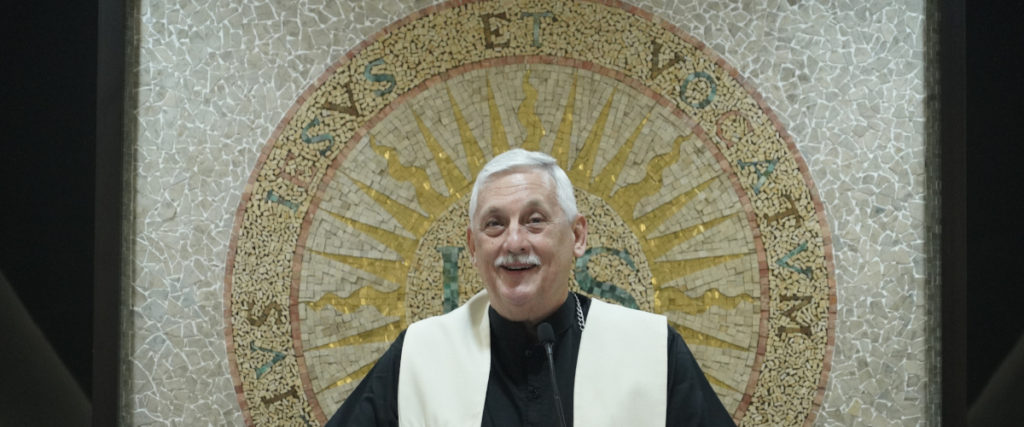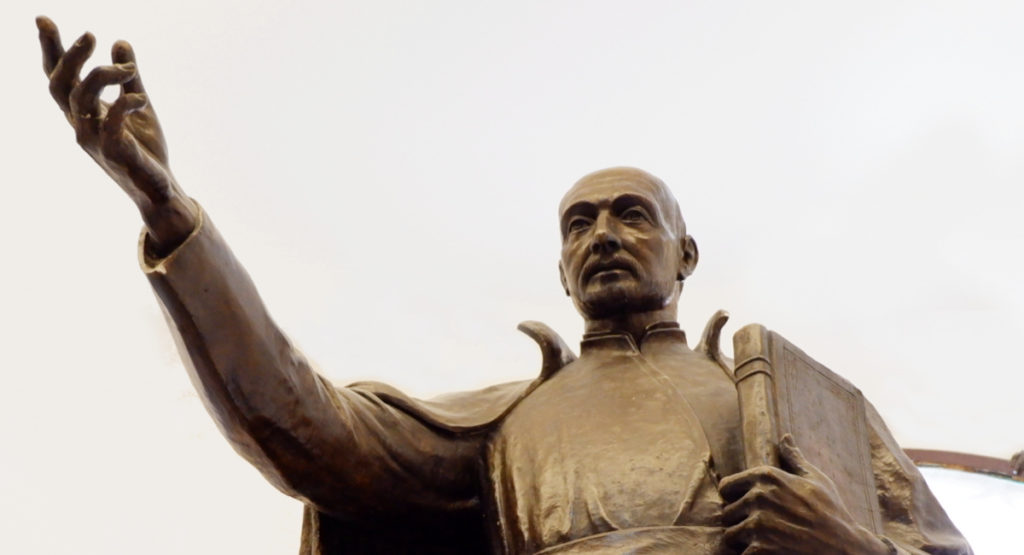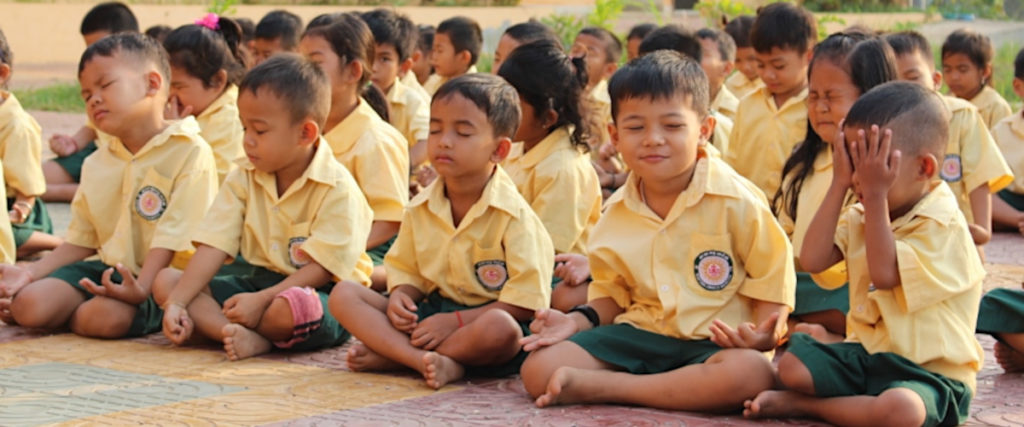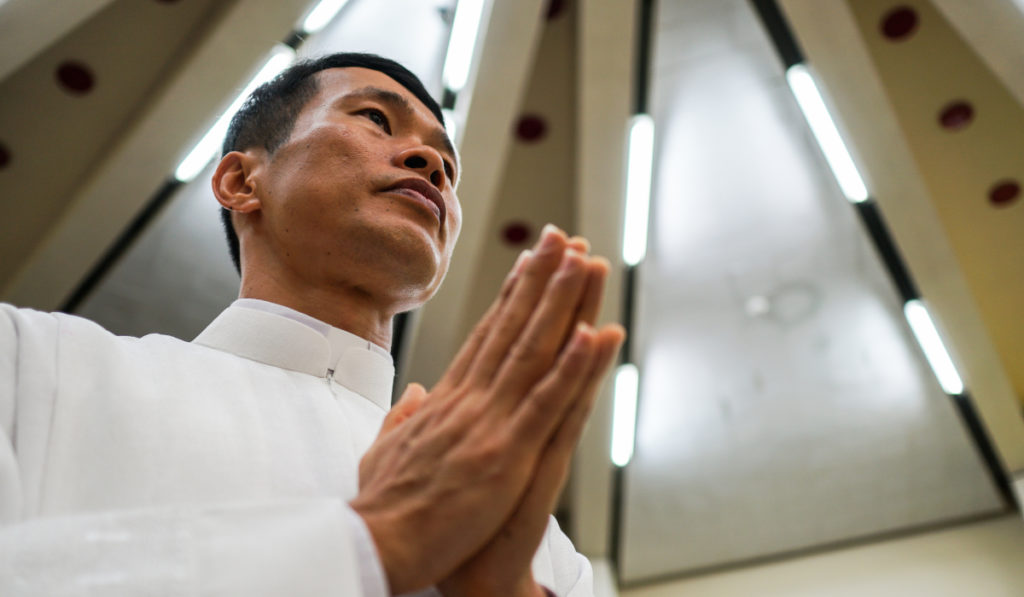“Having fun with theology”
Fr Nguyen Hai Tinh SJ, Formation Delegate of the Vietnamese Jesuit Province, has started a series of online video lectures on theology designed for catechists, theology students and anybody interested in theology. Each episode lasts no more than 10 minutes and uses humour and animation to capture viewers’ attention.
The videos, which are posted weekly on Jesuit Communications Vietnam’s YouTube channel, offer easy-to-understand explanations in Vietnamese on subjects related to dogmatic theology such as, Introduction to Theology, Revelation of Faith, Scripture Tradition and Magisterium, Trinity, Christology and Eschatology.
Fr Tinh currently teaches theology at St Joseph Jesuit Scholasticate and at the Catholic Institute of Vietnam of the Catholic Bishops’ Conference of Vietnam. He has a Doctorate in Sacred Theology, with a specialisation in dogmatic theology from the Gregorian University in Rome.
The Vietnamese priest has constantly sought out effective ways of teaching theology. He found that there are many videos online teaching a wide variety of subjects but it seemed to him that there was nothing on theology. This inspired him to start the online video lectures.
There are about 57 million active social media users in Vietnam and 71 per cent of those who access the Internet every day watch videos on a daily basis. Since it was launched, Fr Tinh’s videos have been watched more than 8,000 times.
In this interview, he talks with Jesuit Communications Vietnam about the process of developing each episode and how social media has helped him in his work of evangelisation.
Fr General to visit Korean, Chinese and Japanese Provinces
Superior General of the Society of Jesus Fr General Arturo Sosa SJ is set to visit Korea, Macau, Hong Kong, Taiwan and Japan in the next three weeks. This is Fr Sosa’s third official trip to the Jesuit Conference of Asia Pacific after visiting Vietnam and the Philippines last year, and Indonesia and Cambodia in 2017.
A big part of Fr General’s visits to the different conferences is to learn more about the Jesuits and their commitments in their places of work. In Asia Pacific where only three per cent of the population is Catholic, the call is clear for dialogue with religious traditions and various cultures.
In Korea, where he begins his trip on July 15, Fr Sosa will not only be meeting with the Korean Jesuits to animate and inspire them with the Universal Apostolic Preferences but also to understand the various contexts in which they work. One of these is in their mission of reconciliation. On July 16, Fr Sosa will visit Panmunjom, a small village located in the Korean Demilitarised Zone (DMZ) on the border of North Korea. The DMZ was established after the Korean War to serve as buffer zone between North Korea and South Korea.
Throughout his three days’ stay, Fr General will also learn of the intellectual apostolate and the youth ministry of the province from meetings with collaborators, staff and students of Sogang University, Jesuits in formation and young people.
Fr Sosa will next visit the Chinese Province where he will make stops in Macau, Hong Kong and Taiwan. His activities will centre around the theme, “Ignatian bridge building” and will thus include many meetings with Jesuits and lay collaborators.
From July 18 to 19, Fr Sosa will meet with lay collaborators from the two schools in Macau, Colegio Estrela do Mar and Colegio Mateus Ricci, where he will take part in the graduation ceremonies. He will also meet with the staff of Macau Ricci Institute, a study and research institution dedicated to fostering better mutual understanding between China and the rest of the world, and Casa Ricci Social Services, which helps poor and marginalised communities in China.
In Hong Kong, from July 19 to 21, Fr General will meet with Jesuits and collaborators for a sharing on the Universal Apostolic Preferences. He will also celebrate Mass for the 60th anniversary of St Ignatius Chapel in Wah Yan College Kowloon, as well as preside over the Final Vows of two Jesuit priests in Wah Yan College Hong Kong. Then on July 22, Fr Sosa will join the JCAP major superiors in their five-day assembly.
On July 27, he flies to Taipei where he will spend the next three days. He will get to know the lay partners, speak to leaders of Ignatian families on how they can be closer collaborators in living out and promoting the Universal Apostolic Preferences, and visit Jesuit parishes and the Fu Jen Faculty of Theology of St Robert Bellarmine. He will also join an advance celebration of the Feast of St Ignatius.
Fr General will conclude his visit to Asia Pacific in Japan. On August 1, he is scheduled to meet with his predecessor Fr Adolfo Nicolás SJ and later with the Japanese scholastics. He will also be going to Hiroshima for a gathering with collaborators and to talk about Servant of God Fr Pedro Arrupe SJ who was a missionary in Japan during the Second World War. One of his stops will be the Atomic Bomb Dome and the Hiroshima Peace Memorial Museum on August 3.
He returns home to Rome on August 4.
The gift of education in Cambodia
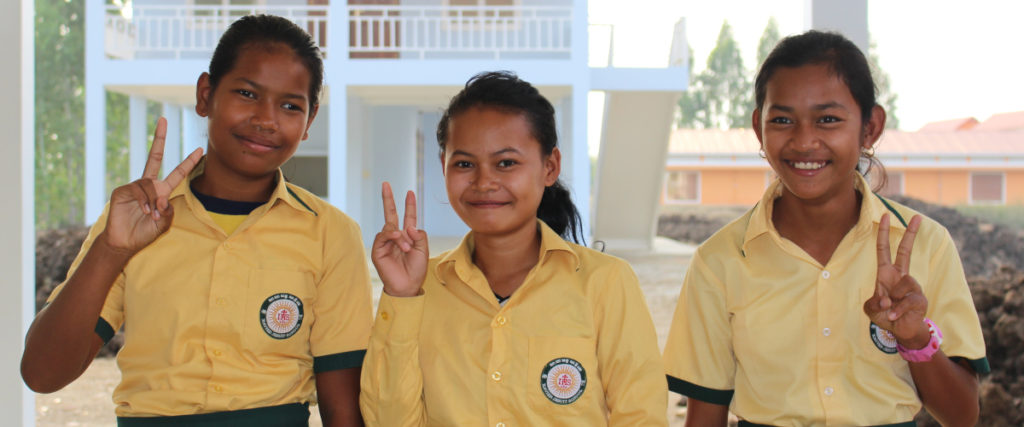 It has been 20 years since the surrender of the Khmer Rouge, but Cambodia remains deeply scarred by decades of war and conflict. One of the poorest countries in the world, it has vastly inadequate healthcare and education infrastructure. Just one in four young people finish high school and even fewer in rural communities. Sometmes children as young as 10 years old engage in unsafe and heavy work, labouring on construction sites or farms. Even if children stay in school, the standard of education in government schools is extremely low. Students at 11 or 12 years old often still can’t read or write.
It has been 20 years since the surrender of the Khmer Rouge, but Cambodia remains deeply scarred by decades of war and conflict. One of the poorest countries in the world, it has vastly inadequate healthcare and education infrastructure. Just one in four young people finish high school and even fewer in rural communities. Sometmes children as young as 10 years old engage in unsafe and heavy work, labouring on construction sites or farms. Even if children stay in school, the standard of education in government schools is extremely low. Students at 11 or 12 years old often still can’t read or write.
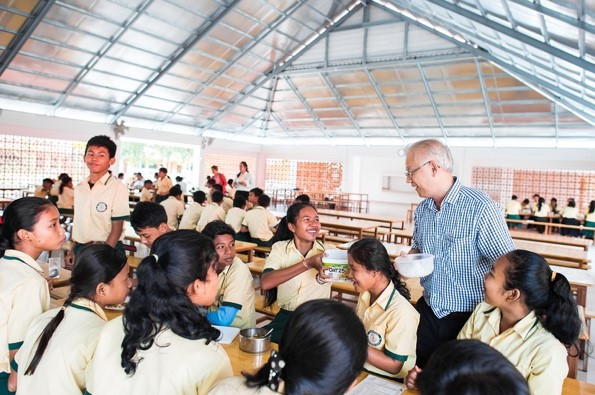
Sophea is one of many Cambodian children struggling to get an education. She lives in a rural area with her mother Mony, a single parent, who had little education herself and works as a day labourer, often travelling great distances to find employment. To educate her four children would cost $4 a day, or 80 per cent of her income. She faces a choice no one should have to make: Should I feed my children or educate them? Mony’s children, like so many others, know they must help out from an early age. The eldest child usually stops schooling to help supplement the family income. Sophea had started government primary school but could not attend regularly. She and her older brother had to find work to help Mony care for their two younger siblings.
One day Jesuit Service Cambodia (JSC) found Sophea in a bottle factory working with her mother. JSC’s outreach team travels around to poor villages in search of families that need help. They identified Sophea as a scholarship candidate for Xavier Jesuit School.
In 2015, the Jesuits opened Xavier Jesuit School (XJS) in Banteay Meanchey, one of the poorest provinces in Cambodia.
“Our goal is to convince students that you sacrifice a few years now, but then you can help not only yourself, but your family,” says Fr Quyen Vu SJ, the school’s director. “Through education these students can go on to have skills, a career, a profession.”
The school encourages independent thought instead of the usual rote-learning taught in Cambodian schools. It strives to empower students, strengthening their hearts and minds so they can learn, grow and contribute to the new future of Cambodian society.
In addition to traditional subjects like mathematics, English, chemistry, physics, biology, history, geography and agriculture, students also learn Khmer, music and art.
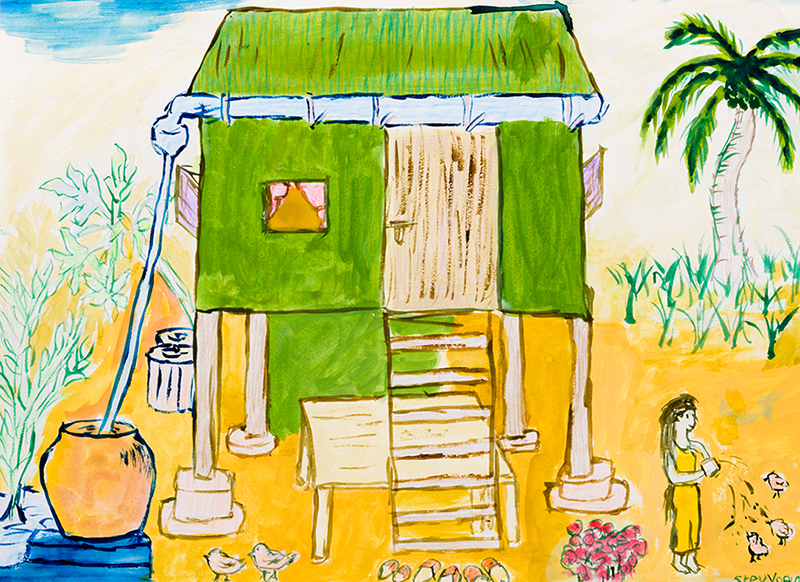
Currently 530 students attend XJS from kindergarten to Year 12. Within three years, Fr Quyen hopes to increase that to 1,210 students. XJS is committed to serving the poorest of the poor with at least 20 per cent of the student cohort to receive free education through scholarships, such as those provided by Jesuit Mission Australia.
Scholarships ease the burden for very poor families. In the short-term, families have the benefit of one less mouth to feed, while in the long-term young people help lift their families out of poverty as they use their education to become teachers and future leaders.
Sophea had a tough first year at school. She was 16 but still in Year 7, which meant she had to study with peers three or four years younger than she was and often academically more advanced. She also struggled with her guilt about leaving her mother and younger siblings.
But Mony’s vision for her daughter is strong. She encouraged Sophea to be brave and to dream of a worthwhile future. After a year, Sophea began to take younger children under her wing, and soothe their worries with her jokes and games. Today the change in her is dramatic.
“She is so full of joy!” reports Fr Quyen. “Her hard work and determination are paying off.”
Two years ago Sophea was working as an unskilled labourer. Now, she’s thriving.
To learn more about Xavier Jesuit School and the support provided by Jesuit Mission Australia, visit https://jesuitmission.org.au/program/xjs/
Fostering growth in affective maturity
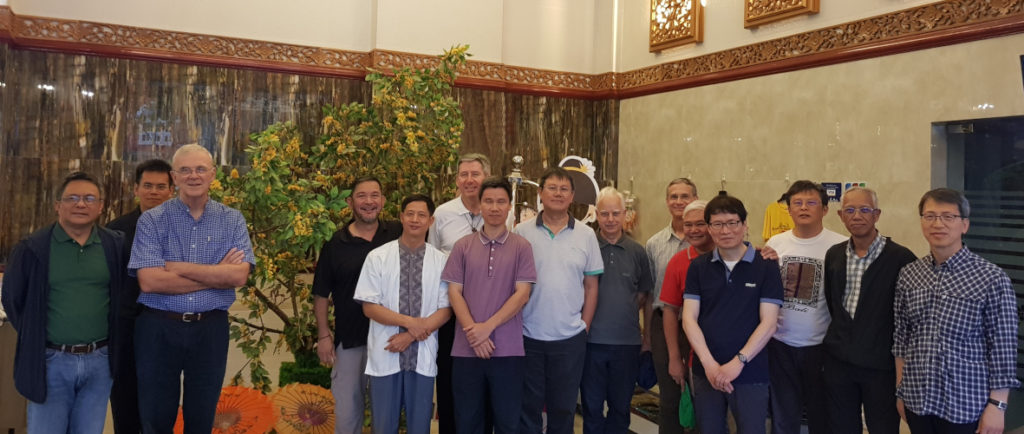 A solid human formation is foundational to every Jesuit. The recent gathering of formation delegates of the Jesuit Conference of Asia Pacific (JCAP) focussed on how to help Jesuits in formation to grow in affective maturity and celibacy.
A solid human formation is foundational to every Jesuit. The recent gathering of formation delegates of the Jesuit Conference of Asia Pacific (JCAP) focussed on how to help Jesuits in formation to grow in affective maturity and celibacy.
This year’s meeting held from June 17 to 20 in Yangon, Myanmar followed through last year’s topic on “Safeguarding the Minor”. Fr James Gascon SJ, psychoanalyst, counsellor and former director of the Center for Family Ministries in the Philippines, guided discussions on motives for living a celibate life, the theological dimensions of celibacy and sexual identity, sexual maturity and integration, boundaries, and accompaniment of homosexuals in formation.

Although the sessions were loaded and intense, the delegates appreciated the serious study and presentations, particularly in naming, identifying and clarifying issues related to celibate chastity, sexuality and sexual identity in relation to Jesuit formation. These subjects are often difficult to talk about in an Asian context, where in many places they are considered sensitive and taboo. The presentations were, in fact, mostly based on a Western context, as Fr Gascon admits, because of the dearth of research in the Asian context. The invitation after the sessions was always for us to reflect on how the inputs made sense in our work of formation in our own provinces and regions.
Besides the presence of JCAP Formation Delegate Fr Riyo Mursanto SJ and JCAP Delegate for Studies Fr Robin Koning SJ, we were graced by the participation of Fr Mark Ravizza SJ, General Counsellor for Formation. He shared about formation vis-à-vis the new Universal Apostolic Preferences (UAPs) of the Society. Fr Ravizza emphasised understanding the preferences as “orientations” and not simply as priorities, thus, considering the UAPs as a “spiritual path” – “a dynamic means for continuing to be guided by the Spirit”, a new way of proceeding, a process of discernment.
The UAPs are given to us as “a guide to the renewal of life and mission that General Congregation 36 sought, to respond to who we want to be and how we are called to live”, said Fr Ravizza. They invite “each person, community and institution to enter into a process of discernment to hear and respond to the cries of the poor, the youth and the earth in their local context”. Therefore, the UAPs are an invitation to a “conversion that empowers the mission”. In this understanding, Fr Ravizza reminded us how the Spiritual Exercises, spiritual conversation and discernment in common are important tools that help us “to show the way to God”.
After three days of earnest discussions, we visited Campion Institute, the English language school, and the newly opened Myanmar Leadership Institute in Yangon to gain a better appreciation of the Society’s work in Myanmar. A visit to the country would be incomplete without stopping by the 2,500-year-old Shwedagon Pagoda, a magnificent Buddhist temple about 110 metres high, covered with gold plates and a stupa encrusted with over 4,000 diamonds. We ended the meeting with a prayer for the country and for the Jesuit Mission in Myanmar.
Ignatian insights for living
Fr Brendan McManus SJ, who works in the area of spirituality and spiritual accompaniment in the Irish Province, says he has had a great life as a Jesuit. “The most valuable insights have come from the Ignatian training I have received, how to reflect on experience and make good decisions”, he shares.
From this perspective, he writes to his 15-year-old self 15 “rules of thumb” he has found useful in his life. All of them have Ignatian references. For example, in tip #2, he takes cue from St Ignatius that God is in our deepest desires, not the superficial ones. Working in the computer industry prior to joining the Jesuits, he acquired all the material possessions and status he thought he desired, but he found it to be “a desolatingly empty experience” and prompted a search for his “true vocation as a priest”.
But finding one’s true vocation does not mean living a perfect life. In tip #4, Fr McManus cautions against pursuing idealism and perfection so much that we beat ourselves up and agonise over its unattainability. “In Ignatian Spirituality there is spelled out the terrible dilemma of life that perfection and idealism, while seemingly good things, can often lead to disillusionment and despair… [T]here is normally a third option, or middle way, that threads a course between extremes.”
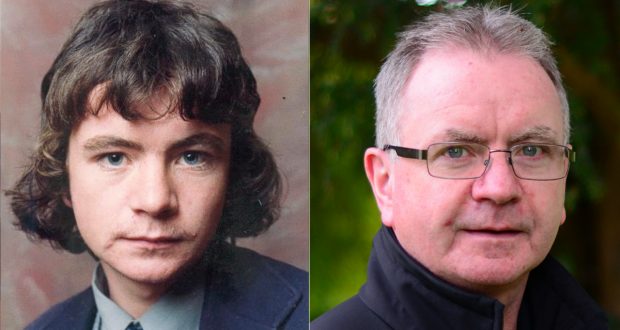
Fr McManus remembers that as a Boy Scout, he was taught there is always enough in your environment to solve the problem. “It’s never going to be ideal but there are options and decisions to be made… Therefore, instead of wishing it were different, look around and see what you can use.” In other words, instead of wishing for perfection, “Bloom where you are planted” (tip #7).
Indeed, there is no panacea for all of life’s troubles. “In my work as a spiritual director and hearing people talk about their lives, I often hear of the illusive search for the ‘silver bullet’ or magic ingredient that will suddenly solve all life problems”, Fr McManus shares in tip #8. In reality, the solutions are often mundane and process based, requiring effort and commitment on our part. Referencing St Ignatius: “God normally does not appear in the miraculous but through human processes; ‘everyday’ miracles.”
Do not be afraid to ask for help. In fact, “Asking for help is the greatest wisdom” (tip #10). “Often the obstacle is pride, independence and being afraid to be seen as weak or needing help. Ignatian wisdom has a really useful rule of thumb: you need to deliberately act against those negative impulses that stop us from getting the right help”, he says. Actively seeking out support makes life a lot more bearable.
“There are not limitless possibilities but possibilities within the limits” (tip #12). Fr McManus has discovered that knowing your limits, such as how far you can go without rest and food, can help you achieve significant goals of pilgrimage, collaborations and meaningful friendships. Walking the Camino, he says, is a real teacher of humility and respect for limits. “Hearing people, mainly young men, boast how they will walk twice as long and beat the ‘record’, never fails to amuse me as I was there once and have come to see the folly of pride!”
Finally, Fr McManus gives the most important tip to his young self and to each of us: “Let life teach you.” We have no control over the cards we are dealt but we have a choice about how we approach problems and opportunities. As Ignatian Spirituality teaches us, we can find God in the mess. “Though the stakes are very high and consequences are real and imminent, there is normally a way through and hope is our guiding light.”
To read all of Fr McManus’ “15 Ignatian rules of thumb”, click here.
Xavier Jesuit School children practice mindfulness meditation
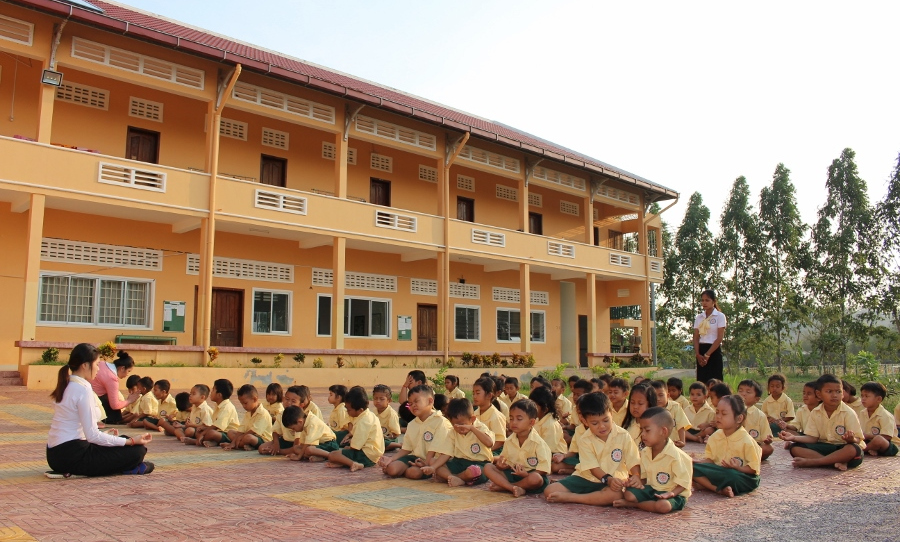 Xavier Jesuit School Cambodia introduced “Mindfulness Meditation” to the kindergarten and primary school students during their morning assembly and lunch break.
Xavier Jesuit School Cambodia introduced “Mindfulness Meditation” to the kindergarten and primary school students during their morning assembly and lunch break.
It was quite a challenge to get the kids to sit still, stay calm and close their eyes while concentrating on their own breathing.
Through hard work and a lot of patience, the teachers were able to overcome the difficulties and successfully accompany and guide the students through a mindfulness meditation exercise every day.
Now the students are very familiar with this daily activity. As soon as prayerful music is played their faces reveal enjoyment of this quiet and peaceful activity. Through mindfulness meditation, the students will develop a gentle and peaceful character, which is central to their Buddhist culture and tradition. [Xavier Jesuit School Cambodia]
Diaconate ordination in Taiwan
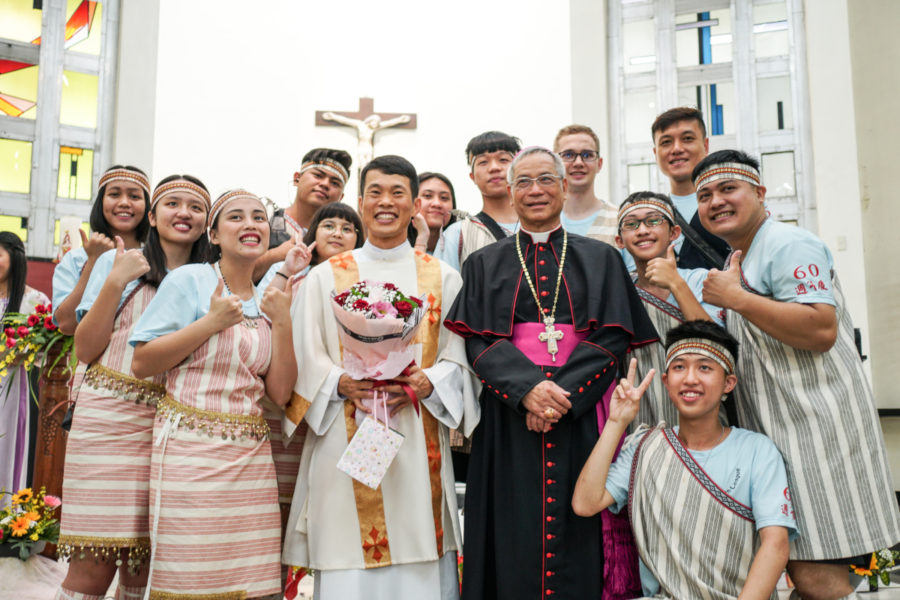 Family, friends and members of religious communities gathered on the bright morning of June 8 to witness the diaconate ordination of Joseph Dang Do Nhan SJ by Most Rev John B Shan-Chuan Hung SVD, Archbishop of Taipei. The Mass was held at St Robert Bellarmine Chapel of Fu Jen Faculty of Theology of St Robert Bellarmine, New Taipei City.
Family, friends and members of religious communities gathered on the bright morning of June 8 to witness the diaconate ordination of Joseph Dang Do Nhan SJ by Most Rev John B Shan-Chuan Hung SVD, Archbishop of Taipei. The Mass was held at St Robert Bellarmine Chapel of Fu Jen Faculty of Theology of St Robert Bellarmine, New Taipei City.
The solemn rites were celebrated with music, indigenous dance and choir. The atmosphere was warm and joyful. Archbishop Hung encouraged Deacon Dang to serve God and fulfil His Holy Words with a pure heart. He also asked the congregation to pray for the new deacon’s family who have generously dedicated their son to God.
Deacon Dang expressed his gratitude foremost to the Lord who continues to love sinners like him. Originally from Vietnam, he also thanked the Vietnamese Province, where the seed of his vocation was planted and grew, and the Chinese Province for accepting his desire for an international Regency. Lastly, he thanked his family for their company, support and encouragement.
Deacon Dang first thought of becoming a priest as a child. The dream gradually faded out, but many years later, while at Mass, he found himself very touched by the singing of the Peace Prayer of St Francis. This time he decided to respond to God’s call. When he shared his desire to pursue the priesthood with his mother, she told him it was a difficult road to follow. “Dare you go to the end?” she asked. Deacon Dang replied, ”Just support me and give the rest to God. He will surely help me to complete this journey!”
Indeed, Deacon Dang has deeply felt God’s love and help throughout his vocation. Looking back he says his most impressive experience is failure. Instead of being frustrated, he believes failure has taught him to listen, to open himself up, to accept others more easily, to comfort others and to help others out of their worries. In the process, he always thanks God for accepting his imperfections and filling in his shortcomings from time to time.
Deacon Dang admits he is nervous about the responsibility that lies ahead, yet he is filled with hope in spreading Jesus’ love through social services. He believes that when you serve, people can see you as a witness of love. Quoting John 15:12, he said, “Love one another as I love you.”
Educating for depth and reconciliation
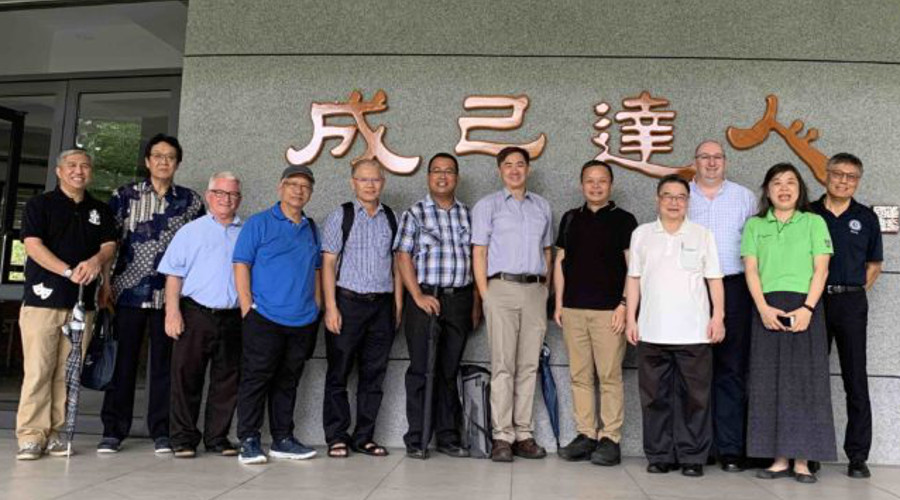
Education Secretaries of the Jesuit Conference of Asia Pacific (JCAP) were in Taipei from May 14 to 18 to discuss the II COLLOQUIUM JESEDU JOGJA 2020, and to identify concrete ways in which the Universal Apostolic Preferences (UAPs) of the Society of Jesus can be promoted by our schools.
II COLLOQUIUM JESEDU JOGJA 2020 is the second global gathering of Jesuit secondary schools. The first international colloquium was held in Boston College in 2012. About 500 school leaders will gather in Sanata Dharma University, Yogyakarta, Indonesia from June 29 to July 4, 2020 to learn more about “Educating for depth and reconciliation”.
The education secretaries held spiritual conversations on the UAPs. To concretise the conversations, they identified what they considered “crucial threats” and “promising opportunities” in their work of education.
“The discussions were rich and full of fresh insights that should guide our schools in concretising these apostolic preferences this decade”, said JCAP Education Secretary Fr Johnny Go SJ. “The conversations about the UAPs are expected to continue among our schools”, he added.
Apart from the annual reports from the Provinces and the Regions, the group also took the opportunity to visit St Ignatius High School (徐匯中學), where each learned about the school’s flagship formation programme called Life Education.
A call for a compassionate and humane Australian society
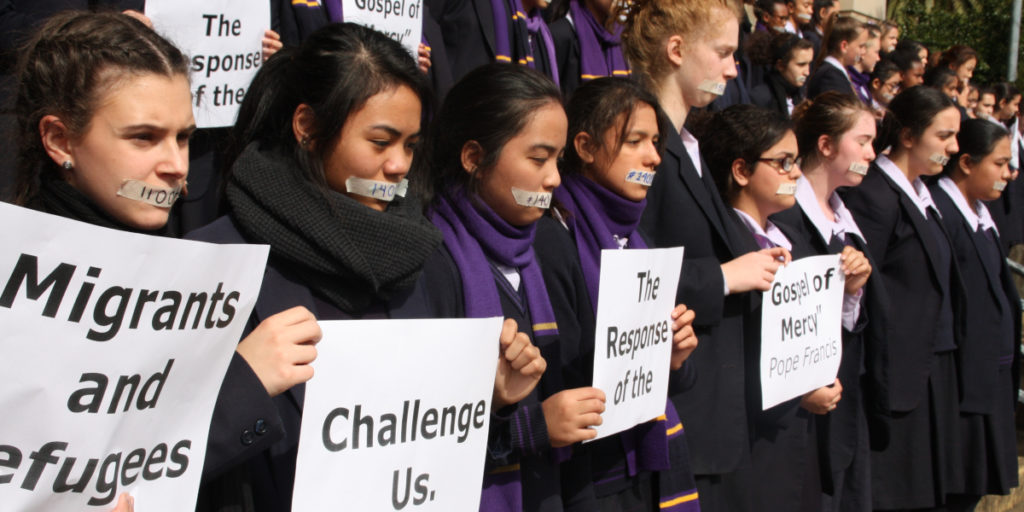
With the Federal Election in Australia on May 18, the Catholic Alliance for People Seeking Asylum (CAPSA), in which Jesuit Social Services takes a lead role, has issued a statement calling for a “commitment from all sides of party politics to language and policies that reflect a compassionate and humane Australian society”.
The statement draws on the words of Pope John Paul II and calls for a change in the way Australia sees, treats and lives together with people seeking asylum.
“[W]e need to heed the words of Pope John Paul II ‘to see Christ in every brother and sister in need, to proclaim and defend the dignity of every migrant, every displaced person and every refugee. In this way, assistance given will not be considered an alms from the goodness of our heart, but an act of justice due to them’”, the statement said, quoting Pope John Paul II’s speech to the participants in the Assembly of the Council of the International Catholic Migration Commission in 2001.
CAPSA urges the incoming Federal Government “to legislate and make policies that are fair and compassionate” adding that the “[d]iscriminatory treatment towards people seeking asylum who have arrived by boat to Australia is unnecessary for the security of our borders. It is possible to be both fair and kind.”
The organisation lamented the current situation of people seeking asylum in Nauru and Manus islands and the “thousands of vulnerable individuals and families who are at risk and suffering destitution due to Government support being removed and no longer offered”.
The statement said it is everyone’s challenge “to use language and to act in a way that consistently acknowledges the human dignity and preciousness of each person who seeks asylum”.
Australia is the first country from the Pacific region to serve on the UN Human Rights Council.
CAPSA calls on political leaders and policy makers to re-work the way Australia complies with its international obligations and the personal needs of those who seek asylum.
“Australia’s current policies and processes relating to those seeking asylum, with distinctive discrimination against those who arrived by boat, cannot be characterised as fair – nor can the large sums of money spent on detention centres, both onshore and offshore”, they said.
The organisation reiterated its commitment to serve, assist and journey with people seeking asylum and refugees across the health, education, pastoral and social spheres.
“The Catholic community stands ready to continue our work of welcome. Our political leaders must introduce and champion policies that complement the wonderful work that so many Catholic parishes, schools, organisations and congregations do to welcome and accompany people newly arrived to this country.”
Read the full statement here.
Global Compacts: walking with the excluded and the marginalised
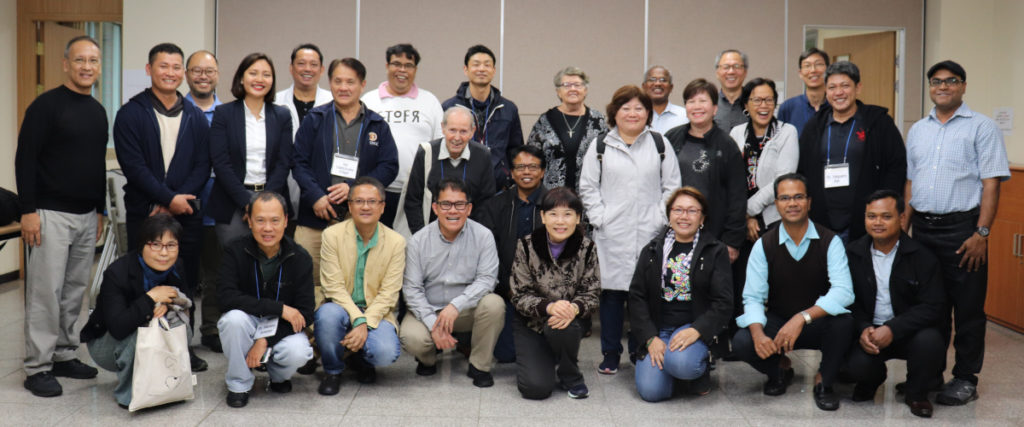
In a time of increased globalisation, it is a sign of the times to live with the “stranger”. How do we prepare for the increasing number of migrants and refugees, and what should be our focus?
From April 25 to 29, the Jesuit Conference of Asia Pacific (JCAP) Migration Network hosted a forum at the Jesuit Center, Seoul to discuss an important question – what should we do at the moment when we are witnessing an increased presence of migrants and refugees in our communities? Twenty-five of us from 13 institutions, and 12 countries discussed how to better welcome, protect, promote and integrate migrants and refugees and the best way to build a network and work together.
The forum specifically focused on the Global Compact on Refugees (GCR) and Global Compact for Safe, Orderly and Regular Migration (GCM), which were adopted in December last year. We discussed how to implement the Global Compacts and how to advocate for the implementation of these significant agreements focusing on each nation’s context and regional realities.
The GCR was adopted to respond to the challenges of 68.5 million forcibly displaced people worldwide and to look at responsibility sharing between different member states. The adoption of the GCM was a historic development to protect the rights of migrants as the first instrument focusing on increasing international collaboration to address international migration in all its forms.
One hundred eighty-one countries adopted the GCR and 164 countries adopted the GCM. The GCR focuses on responsibility sharing and complements existing international Refugee Law including the Refugee Convention of 1951 and its additional protocol. The GCR aims at increasing responsibility sharing between states looking at the needs of countries hosting a high number of refugees, promoting refugees’ self-reliance and promoting durable solutions, including safe and dignified return. The GCR aims at collective efforts for refugee focused solutions and equitable responsibility sharing.
The GCM is the first instrument of its kind with 23 targeted objectives to address international migration in all its forms including addressing drivers of migration, focusing on migrants in vulnerable situations, increasing regularisation pathways, promoting decent work and labour rights, addressing climate induced displacement and taking measures to end child immigration detention, amongst others. The positive response from many countries shows that refugees and migration are our common challenges requiring a global response.
Unfortunately, the GCR and GCM are non-binding instruments. The Global Compacts are not an international treaty but an agreement, which means that member states can decide how they implement them in accordance with their national priorities. All countries that adopted the Global Compacts committed to protect and promote the rights of refugee and migrants but they can decide how to do it. At this early stage national implementation of the GCs is uncertain. So civil society and faith based organisations’ concerted effort including advocacy and putting pressure on each national government is critically important for the implementation of the GCs.
The forum in Seoul focused on two themes. The first was to increase understanding on the GCs. The second was to study good practices of advocacy. The aim was to encourage the development of networks and increased collaborations for refugees and migration.
During the first session, Jane Williamson of UNHCR Korea clarified the significance of the GCR. She pointed out that the GCR promotes a “whole of society” approach including governments and civil society and long-term and ongoing plans of refugee solutions. She compared the GCR with previous conventions and concluded that the GCR is a more comprehensive response requiring networking between government and civil society, different countries and between the national and local levels.
Carolina Gottardo, Director of Jesuit Refugee Service (JRS) Australia and the focal point on the GCM for Asia Pacific Refugee Rights Network (APRRN) expounded on the GCM and the implementation architecture of both Global Compacts. She stressed that it is important for the Church and Church institutions to implement the GCR and GCM. She said there have been several agreements and conventions on refugees but the GCM is the first global comprehensive agreement looking at all dimensions of international migration. It is not legally binding but it has a good normative potential.
Naoko Maruyama, Regional Coordinator of East Asia and Southeast Asia for the Migrants and Refugees Section, Vatican, introduced “20 action points for the Global Compacts” and said that it is the mission of the Church and Church institutions serving migrants and refugees to “welcome, protect, promote and integrate” them.
We also had other sessions examining the cases of promoting and protecting migrants and refugees’ human rights. Nishadh Rego, Policy and Advocacy Coordinator of JRS Australia, talked about the meaning and role of advocacy activities in the areas of migration and refugees and how advocacy activities could be developed in the specific context which each institution faces. In the process of advocacy, it is important to consider the potential to achieve the goal. When we try to achieve a certain goal or value, it is necessary for us to focus on the specific goals that we would like to achieve.
Dany Gerra of Solidarity with Migration, an activist NGO in Korea, shared his experience as an undocumented migrant worker and community leader. His message focused on advocating for human rights of Overseas Filipino Workers in Korea. On April 28, we visited YIUTSARI, the Jesuit institution for migrant workers, and had the opportunity of listening to the voices of Vietnamese and Filipino migrant workers living in Korea.
The JAP Migration Network at YIUTSARIFor us in the JCAP Migration Network, the implementation of the GCs may be understood in the context of the Universal Apostolic Preferences. The implementation can be enlightened by our commitment to “walk with the excluded and the marginalised”. JCAP President Fr Tony Moreno SJ pointed out that responding to the issue of migration and refugees is a priority and necessitates an inter-conference and inter-provincial collaboration. The effort for collaboration, he said, should be based on discernment and planning.
After a four-day meeting, the participants reached the following conclusions.
First, the JCAP migration network will focus on deepening understanding of the two Global Compacts. It is important for ordinary people to understand the implications of the GCs on migration and refugees, considering that these GCs are significantly important in the history of migration and refugees. We agreed that the network will translate these key documents into local languages and also produce video clips and animation on the GCs.
Second, the GCs are a comprehensive framework for migration and for the network. The network recognises the fact that each country has its own specific context and naturally we need to contextualise the GCs on the realities of each country. Internal research will be completed as part of the preparatory process for national implementation of the GCs.
Third, the network will find partners for advocacy programmes on the implementation of the GCs. Church institutions such as Caritas and other organisations – especially APRRN – could be our partners for advocacy and awareness-raising on migration and refugees.
The next meeting will be in Indonesia in 2020. Until then, the JCAP Migration Network will share all information related to the process of implementation of the GCs and other services for migration and refugees.
Fr Min Johan Kim SJ is the Coordinator for the JCAP Migration Network. He co-wrote this article with JRS Australia Director Carolina Gottardo.


